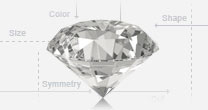- Diamonds
- Engagement
- Jewelry
- Education
- Learn about Diamonds
- Learn about Metals
- What to expect when buying a ring
- Custom Design Process
- The Diamond 4 C's
- How To Care For Your Jewelry
- How To Plan A Wedding
- Picking an Engagement Ring
- Top 10 Ways To Propose
- The Meaning Behind Shapes and Colors of Diamonds
- Advice for Grooms
- The Natural History, Mythology, and Symbolism of Popular Gemstones
- The Bridal Style Checklist
- The Economics of Engagement Rings
- How to Keep Your Diamonds Safe from Theft or Damage
- How to Create the Perfect Christmas Proposal
- The Secret Guide for Authentic Engagement Photos
- How to Plan the Perfect Marriage Proposal
- Best Seasons to Get Married In
- About Us
Conflict Free Diamonds Guide
Conflict diamonds, sometimes referred to as blood diamonds, are diamonds that originate from areas controlled by forces opposed to legitimate and recognized governments. Diamonds mined in these regions are sold to finance armed action against those governments. Oftentimes, diamond miners working in such conflict zones are subjected to severe human rights violations and abuse. Once these diamonds are smuggled into the market, their origin is nearly impossible to determine, which has made the eradication of conflict diamonds a major international problem. The Diamond Vault takes the issue of conflict diamond very seriously and is dedicated to protecting human rights and upholding ethical diamond trade.
Background
A brutal 10-year civil war in Sierra Leone marked the start of a united global awareness regarding conflict diamonds in the early 1990s. The Revolutionary United Front (RUF) usurped countless diamond mines, controlled diamond production, and used their illicit sale to finance terrorism resulting in horrendous violations of human rights. While the conflict specific to Sierra Leone was the central catalyst to international outrage concerning the issue of conflict diamonds, the unlawful production and sale of diamonds had also been used by rebels to fund armed conflict in Angola, Liberia, The Ivory Coast, The Republic of Congo and The Democratic Republic of Congo. By the mid 1990s it became apparent to the international community that it was time to make a collective effort in order to eliminate all illegitimate practices in diamond trade.
The Kimberly Process Certification
- In 2000, the United Nations met with non-profit human rights organizations, governments, and the international diamond industry to formulate a global tracking system which would prevent conflict diamonds to enter the legitimate diamond market. They developed the Kimberley Process Certification Scheme, a contract which requires all participating governments to track and document the path of each and every rough diamond from the mine to its export. The agreement was fully ratified in 2003 and today has been adopted by 74 governments worldwide. The Kimberley Process, which includes a special 'System of Warranties', ensures that every participating government abides by the following practices:
- International rough diamond shipments must be transported in a tamper-resistant container and accompanied by an authenticated government Kimberley Process Certificate.
- Every certificate must be uniquely numbered and must clearly itemize the shipment's contents.
- Every participating government must also maintain a record of its diamond import and exporting as well as the value of its diamonds. These records are subject to periodic reviews.
- Participating governments may export certified shipments to other participating countries only.
- Participating governments may not import or export any uncertified shipments of rough diamonds.
- To ensure full compliance with Kimberley Process terms, participating countries will be subject to periodic reviews and peer monitoring of every stage of the manufacturing and shipping process.
- All rough diamond sales will be individually and privately audited.
- Any country in noncompliance may be accordingly sanctioned by the Kimberley Process.
The System of Warranties
The System of Warranties ensures monitored and documented diamond trade after certified international shipment. Once a diamond is legitimately imported, it may change hands a number of times. Typically it moves from merchant to cutter, polisher, jewelry setter and finally retailer before reaching the consumer. Every time the diamond changes hands, each invoice must include a warranty declaring that the diamond is conflict free. All retailers, manufacturers and traders are required to keep detailed records of invoices for 5 years. Although the warranty is not required to appear on consumer receipts, customers should always check the policies of their diamond retailers to assure that the diamonds they purchase are conflict free.
Africa and Conflict Diamonds
The Kimberley Process has undoubtedly been making a difference. The World Diamond Council has declared that, today, more than 99% of the world's diamonds are from conflict free sources. Sierra Leone, Liberia, The Republic of Congo, The Democratic Republic of Congo and Angola are now at relative peace. Some of these countries are still working towards rebuilding their nation and their economy, and all have joined the Kimberley Process Certification Scheme.
Due to the infamous civil conflicts in these countries, Africa has been underscored as an unreliable source of diamonds and an axis of corrupt and violent diamond trade conflicts. However, this is a general misconception. Only one diamond producing country, The Ivory Coast, is currently barred from diamond mining and trading. The Ivory Coast has been under a UN Security Council Resolution to prohibit the extraction and trade of diamonds since November of 2007.
Additionally, a number of African countries such as Botswana, Namibia and South Africa, have developed legitimate diamond mining and manufacturing centers, which have helped them develop both socially and economically from diamond revenues. In many cases, the diamond industries in these countries provide jobs, a stable economy and a steady income to its citizens. Local partnerships with diamond mining companies have also resulted in public health-care initiatives, education projects, and community service programs.
For more information about conflict diamonds, please visit The World Diamond Council's website, DiamondFacts.org.
We invite you to shop our selection of conflict free diamonds.










